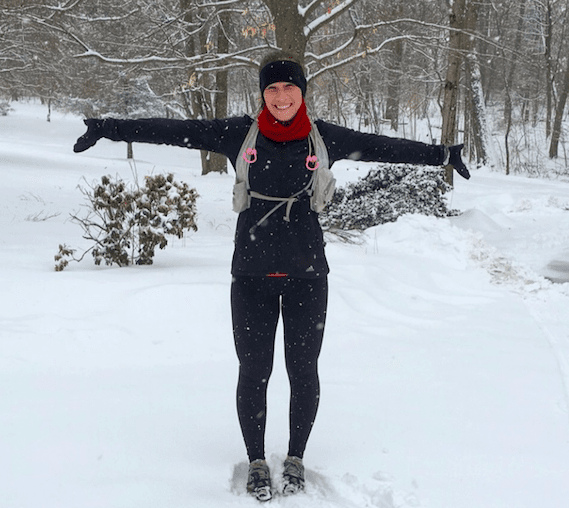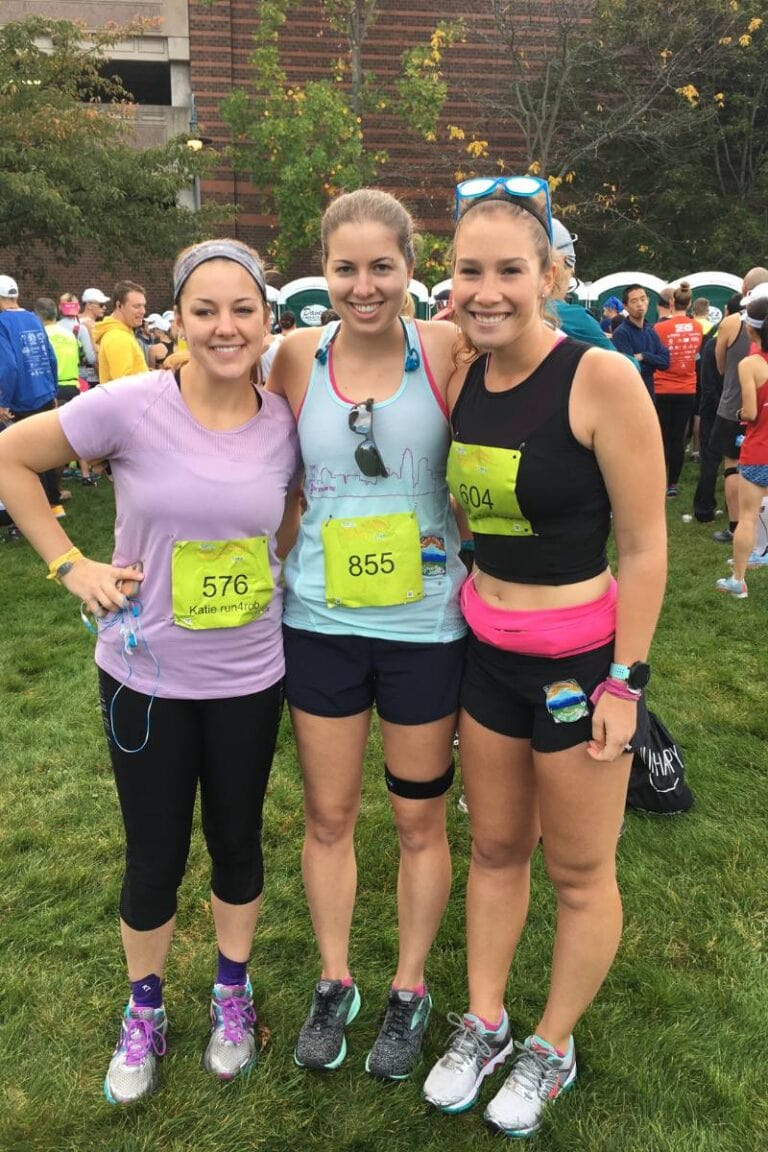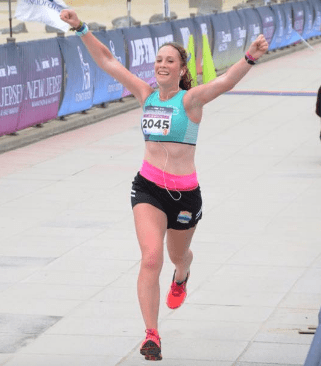How to Run Easy Miles – Calculate your Maximum Aerobic Heart Rate
I feel like I’ve been posting and talking a lot about my easy miles recently. I run all my easy runs, long runs, and recovery runs at at least 10+ min/mile and I am proud of that because it’s made me stronger and faster, and I’ve avoided injuries. Slowing down and monitoring your maximum aerobic heart rate makes you a more efficient runner (aka running further, faster) and lowers your risk of potential running injuries.
Slowing your pace by a few minutes 3-4 times every week doesn’t mean you’re slow, obese, insignificant, or any less of a runner than someone else out there. It’s a smart move, not something to be ashamed of. Just want to throw that out there.
In the fall of 2015 when I was training for the Richmond Marathon, my coach and I calculated my maximum aerobic heart rate (MAHR). Once we calculated the number, I was instructed to run most of my weekly runs slow enough so that my heart rate stays under this number. By doing this, I was training myself to be more of an efficient runner and also to lower the risk for any injury! Well, back in 2015 I had to run mile paces in the 12:30s to keep my heart rate this low! Yes, I was getting passed left and right by every single runner in Boston, but I didn’t care. I kept it slow because I knew in the long run I would become a stronger, faster, more efficient runner.
Fast forward to now, and I have! I can now run in the 9:00s to keep my HR lower than my MAHR. My MAHR has changed a little, and even though I’m stronger, faster, and a more efficient runner than I was 2.5 years ago, I still monitor my HR during easy runs, recovery runs, and long runs. I aim to keep my HR lower than my MAHR and even though I can run in the 9:00s and keep my HR under it, I just stick to the 10:00s because that’s even easier, gets my HR even lower, and gives my legs even more of a break.
So, yes, I run “slow” 3-4x a week to get faster and to avoid injuries. It’s proven, worked for me and is continuing to work. And I will continue setting this example and encouraging people to slow down.
By doing this for 2.5 years, I’ve shaved 3 whole minutes off my half marathon average pace (10:45 –> 7:45) and 1+ minutes off my marathon average pace (9:45 –> 8:30).
Many people reach out to me asking for tips on how to slow down. My biggest pieces of advice?
Be okay with having people pass you and don’t worry about what anyone thinks as they pass you.
If you have a watch that shows your current HR, change your screen so your HR is the only thing that shows. Don’t worry about pace! That will take care of itself.
One of my many running goals is to become a running coach. I am so excited to teach my future athletes about the importance of actually taking easy runs easy and slow, and how beneficial it is to monitor your MAHR if you actually want to get faster and avoid injuries, just like my coach has done for me. Thank you, Siobhan, you are the best! 🙂
Now, will I always run my long runs, easy runs, and recovery runs at 10+ pace? I don’t know. My goal is to get even faster and stronger, and as my paces continue to change, I’m sure that I will be able to run even faster with my HR still under my MAHR. But that’s something I’ll talk to my coach about when the time comes.
Here is a link to an article about MAHR training and “The 180 Formula”, which my coach and I used to calculate my MAHR.
What are your thoughts about slowing down?







I’m a big fan of slow, easy runs (my coach makes me do ’em too!). I was skeptical at first, but I realize that Im definitely running more miles now than before I incorporated these into my week. Someone once drew the analogy to lifting weights– I don’t go and lift at my max weight every time I’m at the gym, so why would I run at my max pace every time I run?
Hi Catherine, I’m a big fan of them too! Progress doesn’t happen overnight but when you start to see it, it’s totally worth it! Comparing it to strength training is a good way to think about it.
Happy running!
Elizabeth
This is an awesome blog post!! I’ve noticed in the world of social media everyone is fixated on “pace” and it’s not all about that. It is refreshing to know where I need to focus my attention and that is on my heat rate . I will try this method and see how it works for me. Thank you much 👍🏽❤️
Thanks Ashley!! I’ve noticed that too, and pace is by no means the only important factor in becoming a stronger runner. HR is HUGE! I recommend this method, just know that results don’t happen overnight.
-Elizabeth
This is interesting and I will definately try this because I wanted to increase my speed. However, I feel that I can run a lot longer now than before.
Hi Karen,
Thank you! I definitely recommend it.
Elizabeth
Hi, Elizabeth!
A girlfriend shared your blog with me (I’m a fellow blogger 🙂 ) after she read this post. I’ve been fighting off an injury for almost a year now. This post hit home. I’m pretty sure I started down the injury road when I amped up my miles AND amped up my pace way too fast. My hamstring was the first indication of something being off. I ran through pain for about 8 months – I had a back-to-back trail run I wanted to do. I know that’s stupid, but I said I’d take a break after that race. I did take a break, but not a very long one. I was back to running after 3 weeks off and my hamstring pain came right back. I had signed up for my first full, so I was a little devastated. I knew I needed to drop to the half (which I’ve done about 16 times). I again took time off, this time 4 weeks. I started back SLOWLY, and had ZERO pain. Well, being the stubborn person I am, I talked to my coach and told him I wanted to PR at the half I’m doing in April. I know, stupid. After building for 4 weeks, running slow, and having zero pain, I started picking up the pace. A little too quickly in my opinion, but I did it anyway. I’m RIGHT back to where I was – after only three damn runs. And now, my knee is hurting, too. It’s just SO frustrating.
Sorry for the lengthy comment, I get a little carried away. Just know, your post inspired me and once I’m back to running, it’ll be SLOW.
Also, I saw your picture of Leadville. I ran the heavy half! When did you run there? My fiancè is a Leadman! He just finished the series this past summer – he proposed when he crossed the finish line after the 100! : )
Have a good day!
Hi! Thanks so much for your comment. Ouch!! That all sounds really painful. I know, it’s so hard to take a break from running but it sounds like it’s necessary now. I hope your hamstring and knee feel better! Yes, I highly recommend starting slow. Remember, just because you run slower a few times a week doesn’t mean that that’s your race pace or you can’t go any faster – quite the opposite actually!
Oh cool! I did the heavy half twice and the full trail marathon 3 times. My fiance actually proposed at the finish line of the full in 2016. Too funny that we both got engaged there!! Congrats to your fiance on being a Leadman and completing the 100! I will be out there again this June running. If you’ll be there, it’d be fun to meet up.
Wishing you a speedy recovery,
Elizabeth
Excellent info! I’ve been reading admit this and I’m hoping to implement it too. Can you do a post to address increasing your cadence? I know it’s important but not sure how to go about it! Keep it up, it’s been fun following your journey!
Hi Eunice,
Thank you! Even though it takes time, it really does work! And sure, I’ll write a post about increasing cadence. I’ve definitely noticed how much it helps. Thank you! Happy running!
Elizabeth
Hello! I loved your post and am excited to try this for my first full marathon training. I’m currently do a 4 seasons challenge 3 halves and a full in about a year. I’m just about toward the end of my second half training and it’s been hard due to minor injuries a long the way. After this half i’m taking a month off to rest before starting to train for a full. Do you have any specific training plan you follow that incorporates heart rate? How many days a week do you run? Do you incorporate speed training and strength training too? My current Garmin doesn’t track HR but i’m thinking I will buy a chest strap now. Sorry for all the questions!
Hi Christine,
No worries, I love answering questions! So exciting about all of your halves and your first full! I think taking some time to rest is a very smart idea, especially since later this year you’ll really ramp up training for the full. So I work with a coach who creates training plans for me. When I started working with her in the fall of 2015, she had me run most of my training runs while monitoring my MAHR. Now, I monitor that only for easy, long, and recovery runs, as well as warmup and cooldown miles. I run 6 days a week, with one complete rest day. I do strength train, usually 3-4 time a week. Yes, I do speed training too – one speed workout a week and one tempo run a week. Make sure if you strength train that you do legs on a hard running day, like speed or tempo. I’m thinking of buying a HR chest strap too! So many people on IG have recommended them. I hope this helps! Please let me know if you have any other questions.
Elizabeth
This is really good information and I will give this a try. I’ve been very frustrated with my pace during race days because I want to improve at every race. I will definitely try this out and see how I do by end of the year as I will be doing 3 half marathons and I would like to finish in 2 hours as I have been finishing at 2 hours and 27 minutes. Thank you for sharing.
Hi Karen,
Thank you for your comment! I hope HR training has been going well for you.
Elizabeth
I have been keeping my pace at 10ish for my easy run but my heart rate is still a little higher than 140. I guess I have to try to slow down some more.
All depends on what your max aerobic HR is. For me, if mine is in the 140s, I’m fine with that. But it depends on the person, their age, and how their training has been. When I first started out 2.5 years ago, I was running a 12:30 pace to keep mine below my MAHR.
I am 40 so I need to stay under 140 ( 180-40 = 140 ) right? I don’t have a big race coming up so I’ve been doing 2 -3 miles during the week and long runs of 5-7 miles. I will try to keep running under 140 which means I need to go slower for this month and see how that goes.
That sounds great! Yeah, try to stay under 140.
Hey Great Post. Do you run all your miles at the mahr or do you average it over the run? Today I ran 14 km with an average hr of 143 which is one beat below my Mahr. But some of my miles my hr was 150. Also do you follow the diet for MAF?